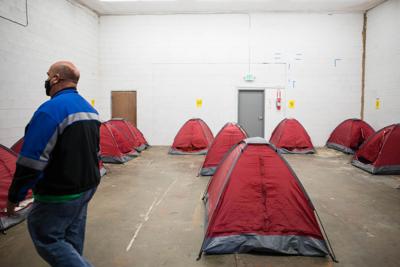To make progress on reducing homelessness, local governments need to rely more on data to make decisions and do a better job of monitoring — and correcting — the nonprofits and organizations they contract with, according to a new report by the Washington State Auditor’s Office.
The performance report is the second time the state auditor has taken a deep dive in reviewing efforts to address the growing problem of homelessness in Washington.
The 18-month review was originally inspired by a Seattle resident who called into the state auditor’s hotline to pitch the idea.
“Washingtonians are growing more frustrated and concerned as the number of people living on the streets and in encampments continues to grow, even as government spends more on programs to address homelessness,” the audit says.
The report focused on Seattle, Spokane, Yakima County and Snohomish County.
Rather than use the data they collect each time someone comes into a food bank, shelter, hospital or police station to prioritize services, the four local governments more often used homelessness boards and people with lived experience, grant funding requirements, and elected leaders to guide their homelessness strategies.
There is much on the line with these decisions.
As of January 2020, the state had more than 22,000 homeless residents, according to an estimate by the U.S. Interagency Council on Homelessness.
Washington local governments spent $357 million on homeless services in 2021. About a third of it, $133 million, came from federal dollars, according to this week’s audit. During the pandemic, the federal government made historic one-time investments in helping state and local governments boost their homelessness responses.
Much of that money is paid to nonprofits that provide a variety of services to help homeless people find food or shelter, register for identification, or get on a list to try to qualify for permanent housing.
The audit said when these service providers performed poorly, government departments rarely took action to address it.
"When the goals set for contractors providing services are not met, we need to hold them accountable,” said Jenn Cerecedes, director of Spokane’s Community, Housing, and Human Services Department.
She agreed with Mary Jane Brell-Vujovic, who leads Snohomish County’s homelessness response as director of Human Services, who said the report is a reminder that local governments can always do a better job of documenting their work with providers, communicating expectations and monitoring provider performance.
When it comes to how to handle homelessness service providers that aren’t meeting their contracted goals, the audit recommends that “holding contracted providers accountable is both feasible and necessary to reduce homelessness, even in the face of external factors.”
Several government leaders said in the report that becomes a challenge when homelessness service providers see such high turnover numbers and when few organizations offer the services they need.
Brell-Vujovic said that while the audit makes some helpful recommendations, it doesn’t take into account outside factors, such as a growing affordable housing crisis, that contribute to homelessness over time even as investments in addressing the issue increase.
“Do I think it's going to have a profound impact on homelessness? I do not,” Brell-Vujovic said.
Seattle's Human Services Department staff outlined why city responses aren't always as data-driven as the audit proposes they should be.
City staff told auditors their recommendations weren’t always enough to sway policymakers. Because the mayor’s office approves the department’s proposed funding plan and the City Council ultimately decides how much it receives, the department’s priorities aren’t always funded the way they would like.
According to the report, Seattle and Yakima County both spend more on shelter, which is not shown to end homelessness, and services that meet other basic needs than permanent housing for people with little to no income.
“Ending homelessness and providing affordable housing is a top priority of the city of Seattle,” said Kevin Mundt, spokesperson for the city of Seattle.
Mundt said the State Auditor’s Office's accounting doesn’t entirely add up because most of the city’s investment in housing comes from the Office of Housing, not the Human Services Department. Between 2017 and 2021, the Office of Housing invested more than $200 million in affordable housing for people exiting homelessness, according to Mundt.
Yakima County started managing a countywide homelessness program in 2019. During the time of the audit, the county had only two staff members to oversee the work, and much of their time was spent distributing rental assistance, according to the report.
The audit will be presented Nov. 30 to Washington's Joint Legislative Audit and Review Committee, according to Sohara Monaghan, senior performance auditor for the state, who worked on the report.
The four audited governments will be invited to attend the event and share their views and plans for implementing the report's recommendations.









(0) comments
Comments are now closed on this article.
Comments can only be made on article within the first 3 days of publication.